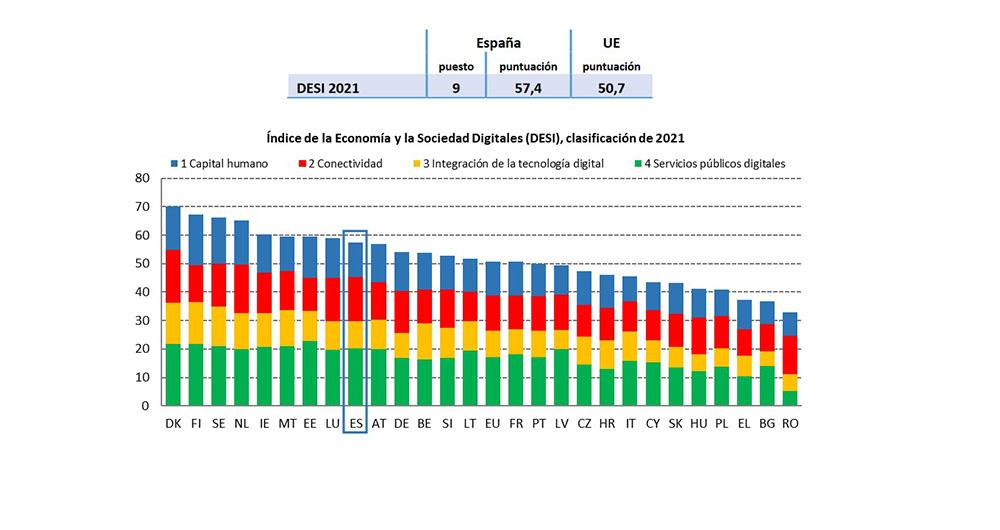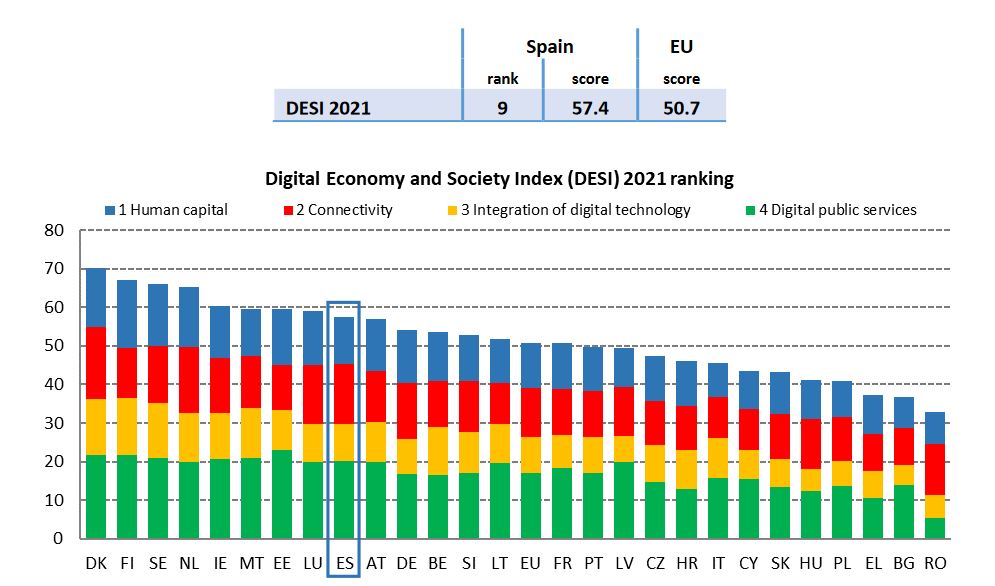
Companies and public administrations in our country continue to advance on their path towards digitalization, with the opportunities that this entails: process optimization, improved user experience, and innovation in the products and services offered. This is reflected in several of the reports published during 2021, starting with the DESI index, prepared within the framework of the European Commission.
DESI Index
The DESI (Digital Economy and Society Index) tracks the progress made by EU Member States in digital competitiveness. For the latest edition, published at the end of 2021, there has been a change in methodology in order to align with the Recovery and Resilience Plan and the objectives set out in the EU Digital Decade Digital Compass. In this way, 4 indicators have been changed to measure: human capital, broadband connectivity, integration of digital technologies by businesses and digital public services.
It should also be noted that the data in the report correspond mainly to the first half of 2020, so the effect of the pandemic is only partially reflected. Its consequences will become clearer in the next edition.
In this context, Spain is positioned in 9th position, improving two positions compared to the previous year.

Spain remains ahead of the European average in the 4 categories analysed, standing out especially in the dimensions of digital public services and connectivity.
- Digital public services. The category where our country scores best, especially in the subsection of open data, with a score (94%) 16 percentage points above the EU average. The report also highlights that 67% of Internet users actively participate in e-government services. Thanks to the Public Administration Digitalization Plan, it is expected that at least 50% of digital public services will be accessible via mobile by the end of 2025. This seeks greater personalization of services and improved effectiveness, efficiency and transparency in the public sector.
- Connectivity. Spain stands out in very high-capacity networks. The differences between rural and urban areas are being increasingly reduced, although they still exist. 99.9% of populated areas have 4G coverage, but 5G still only reaches a minority. To reverse the situation, the Plan for Connectivity and Digital Infrastructures and the Strategy to Boost 5G Technology is underway, a roadmap whose goal is for the entire population to have a connection greater than 100 Mbps by 2025.
- Human capital. The report highlights that 57% of the Spanish population has at least basic digital skills. To increase this figure to reach the European target of 80% by 2030, the Spanish government has included the promotion of the population's digital skills as one of the main lines of action of the Digital Spain 2025 strategy. In this regard, the National Digital Skills Plan has been launched with seven lines of action ranging from the digital training of citizens and the reduction of the digital divide to the promotion of ICT specialists, a field where there is still ample room for improvement. The report also highlights the launch of the Educa en Digital Program, which establishes measures to promote greater digitalization of the Spanish education system.
- Integration of digital technology. 62% of Spanish SMEs have at least a basic level of digital intensity and 24% have embraced e-commerce, but few companies are taking advantage of technologies such as artificial intelligence, big data or cloud services. The response to improve this situation is the SME Digitalization Plan 2021-2025, which has five main lines of action: basic digitalization for SMEs; support for digital change management; promotion of disruptive innovation and digital entrepreneurship; support for sectoral digitalization (with a focus on industry, tourism and commerce); and coordination and efficiency.

Other reports related to digital transformation in Spain
In addition to the DESI index, some reports have also been published in our country during the last 12 months that refer to the current state of implementation of digital tools in different areas.
One example is "Sociedad Digital en España 2020-2021" (Digital Society in Spain 2020-2021), by the Telefónica Foundation. The report analyses the effects of the current healthcare situation on the technological habits of Spanish companies and citizens, globally and by autonomous communities. The COVID has driven the transformation, boosting teleworking and forcing many companies and public administrations to adopt digital tools both for their internal processes and for the relationship and provision of services to citizens. In this situation, the report highlights 3 key aspects:
- The importance of connectivity and the quality of the Spanish network, which faced a massive increase in traffic of almost 50%.
- The acceleration of the digitalization of individuals and companies, with the increase in the number of users connected to the network and consuming online services. It is estimated that digitalization could increase Spain's GDP by between 1.5 and 2.5 points each year until 2025 and improve the productivity of SMEs by between 15 and 25%.
- The need to put people at the centre of digital transformation. The pandemic has also widened the gap between those who have already embraced digital transformation and those who have not yet started. To alleviate this situation, it is proposed to rely on public-private partnership initiatives.
Last year also saw an update of the report The Digitalization of the Economy (originally published in 2017), by the Economic and Social Council of Spain. The debate on the impact of digitalization on productivity and employment has been joined by other new challenges related to the risk of technological hegemony of certain countries and companies, the deployment of 5G, the ethical limits to artificial intelligence or data ownership, among others.
Given that this is a situation in continuous evolution, the reports on the subject are constantly being updated. In the coming months, for example, we will be able to discover the conclusions of the new edition of "The Digital Economy in Spain", by the COTEC Foundation, currently under development.
What cannot be denied is that our country is advancing on its path towards digital opportunities. A path in which it is essential to continue promoting access to quality data and related capabilities to extract its full value.
Soy de Perú, y que España este en el 9 puesto es una gran logro, es un país que lucha cada día mas para salir adelante y seguir pilas que la tecnología avanza, excelente información.